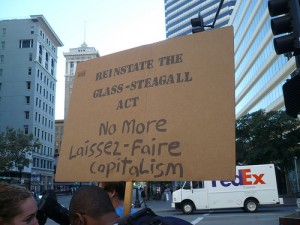A government of, by and for the big banks
 The second hardest thing to explain to future generations — after trying to explain how George W. Bush was “elected” twice — is why we didn’t restore Glass-Steagall after the financial crisis of 2008.
The second hardest thing to explain to future generations — after trying to explain how George W. Bush was “elected” twice — is why we didn’t restore Glass-Steagall after the financial crisis of 2008.
For more than 50-years, this Great Depression-era reform kept our economy from inflating a massive bubble by separating commercial and investment banks. Less than eight years after its repeal, we were facing an even greater depression, until we stepped into save the big banks while asking for nothing but a little interest in return.
The biggest banks have collectively more than regained their value and any attempt to put into place actual reform was stunted by the election of Scott Brown, who helped the banks then write new legislation.
Meanwhile, the banks are bigger than ever and enjoying an $83 billion implicit subsidy from American taxpayers. They’re now not only “too big to fail,” they’re “too big to jail.”
Breaking up or at least demanding that the big banks be able to withstand a loss greater than 4 percent should be a bipartisan priority. And likely would be if not for the extraordinary political influence the banks have on Washington via lobbying.
The banks “frankly own the place,” Senator Dick Durbin said in 2009 as he was trying to pass bankruptcy reform that would have allowed judges to restructure home mortgages during the worst of the financial crisis.
Of course, with a weak recovery, 4 million Americans who have been out of work for more than six months, Republicans denying millions public health insurance as they try to sabotage Obamacare, right-wingers in red and purple states privatizing our economies for the exclusive benefit of corporations, 30,000 people dying of preventable gun violence, chemical warfare in Syria, terrorism in Boston, plants exploding in Texas — even discussing the big banks seems abstract and confusing.
That’s why Sherrod Brown (D-OH) and David Vitter (R-LA) are having a hard time getting people to pay attention to their bipartisan proposal to force the big banks to remain solvent.
But we need to remember this: Nothing has cost the American people more than an under-regulated and under-policed Wall Street. It put millions out of work, cost us trillions in debt and allowed the right wing to wage a war on our already meager safety net.
There is simply no argument against forcing the big banks to keep ample capital reserves to prevent another financial meltdown. But it will never happen unless Congress is as afraid of the people as they are of the banks.
[Photo by celesteh | Flickr]



